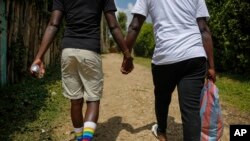Instead, they want targeted sanctions on politicians and sponsors of anti-gay bills.
Robert Akoto Amoafo, advocacy manager at Pan-Africa ILGA (The International Lesbian, Gay, Bisexual, Trans and Intersex Association), told VOA that there certainly must be ramifications on those who spread hate against marginalized groups like the LGBTQI+ community.
"Anyone who does anything wrong to any group of people deserves a sanction, like how anybody [who] wants to harm someone deserve to be punished, they need to have the consequence of their actions."
But Amoafo, like others, says blanket sanctions can be harmful to LGBTQI+ persons.
Last week, while in Ghana during her week-long Africa tour, U.S. Vice President Kamala Harris responded to questions from journalists about how she intended to approach the crackdown on LGBTQI+ rights in countries moving to pass anti-homosexuality measures.
"I feel very strongly about the importance of supporting the freedom…. and fighting for equality among all people and that all people be treated equally," she said.
"I’ll also say that this is an issue that we [the Biden/Harris administration] consider, and I consider as a human rights issue and this will not change," she added.
In a sharp rebuttal, Ghana’s Speaker of Parliament Albin Sumana Kingsford Bagbin took a swipe at the U.S. vice president for her take on LGBTQ+ rights in the West African nation, calling it "undemocratic."
"These things should not be tolerated, that’s undemocratic. What is democracy if somebody else [referring to Harris] will have to dictate to me as to what is good and what is bad?"
He had earlier chastised the parliamentary committee on legal and constitutional affairs, charged with reporting on progress of the bill, for what he called their inaction saying "we need to legislate. Our friends just passed their [bill] in Uganda."
Ghana’s legislature is currently debating an anti-LGBTQI+ bill, formally known as the "Promotion of Proper Human Sexual Rights and Ghanaian Family Values Bill," which seeks to criminalize — with up to five years in prison — persons identifying as a LGBTQI+, or having a gay relationship or intercourse.
Activists say the passage of a similar bill by Uganda’s parliament last month could be an incentive for other states to follow suit. Uganda’s President Yoweri Museveni has yet to sign the bill, amid calls from the international community for him to veto it.
In response to Uganda’s passage of the “Anti-Homosexuality” bill, the U.S. National Security Council spokesperson John Kirby urged Museveni not to assent to the bill. He said if enacted into law, Kampala risks "repercussions" that "may be in an economic way."
"And that would be really unfortunate, because so much of the economic assistance that we provide Uganda is health assistance and largely through PEPFAR," Kirby said.
Amoafo, advocacy manager at Pan-Africa ILGA, said although the U.S. or other foreign partners have the right to withdraw their support to any homophobic African state due to its values, broad sanctions will not only harm vulnerable persons who benefit from such assistance, but cause harm to LGBTQI+ persons themselves.
"We support sanctions that would [make] politicians feel the pinch as individuals and not the victims or people who may also survive on those support," he said.
Nicholas Opiyo, founder and executive director at Chapter Four Uganda, a Kampala-based civil society organization, told VOA that the U.S.' response to Uganda’s "Anti-Homosexuality" bill must be focused on “broader concerns about human rights.”
"There are many cases of extrajudicial killings by the Ugandan state in the past that have not received similar attention and so to focus only on the LGBTQI+ question, in isolation, would only help to make the point by anti–LGBTQI+ groups that the West is more concerned about the LGBTQI+ [community]," he said.
"Any approach must be smart sanctions to safeguard those who are benefiting from U.S. aid in Uganda, but makes those who finance, who propagate this hateful campaign feel the pinch."
Opiyo says Uganda’s bill must be taken as a watershed moment requiring a robust response.
"…at least there should be no doubt as to where we stand on this issue, because the Uganda [bill] is going to inspire similar legislation across the continent, if not dealt with decisively," Opiyo said.
Amoafo added LGBTQI+ persons in Africa would also lose access to critical services in healthcare and education for example, if donor countries and aid organizations pull support from African states with "draconian" anti-LGBTQI+ legislations.
"LGBTQI+ people in African countries also benefit from roads, schools that these funds come in to support," he said.






